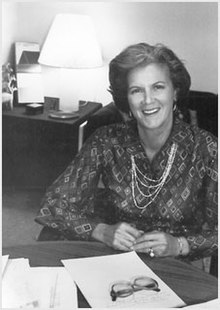Felice Schwartz
| Felice Schwartz | |
|---|---|
 |
|
| Born |
Felice Toba Nierenberg January 16, 1925 New York |
| Died | February 8, 1996 (aged 71) Manhattan, New York |
| Alma mater | Smith College |
| Occupation | Writer, advocate |
| Known for | Founder of Catalyst, Inc., writings on the mommy track |
Felice N. Schwartz (January 16, 1925 – February 8, 1996) was an American writer, advocate, and feminist. During her career, Schwartz founded two national advancement and advocacy organizations. In 1945, she established the National Scholarship Service and Fund for Negro Students (NSSFNS), an association committed to placing African Americans in institutions of higher education. In 1962, she founded Catalyst, a national organization dedicated to advancing women in the workplace, where she served as president for three decades. Schwartz is also well known for her controversial article, "Management Women and the New Facts of Life," published in Harvard Business Review in 1989. The article pitted her against other feminists, such as Betty Friedan, for pointing out the differences between men and woman and their functions in the workplace.
Schwartz was born Felice Toba Nierenberg on January 16, 1925, in New York, to businessman Albert Nierenberg, and his wife, Rose Irene (née Levin). After attending boarding school in Cooperstown, New York, she enrolled in Smith College, where she graduated in 1945. In 1946, she married Irving Schwartz, a physician, with whom she raised three children. After her father's death in 1951, she took over the ailing family manufacturing business with her brother, which they successfully saved and sold four years later.
After graduation from Smith in 1945, Schwartz sought to address the extremely low ratio of African American students at the college. Because she was one of only a few Jewish students at her high school, Schwartz empathized with the isolation of African Americans at Smith. That same year she founded the National Scholarship Service and Fund for Negro Students. The organization petitioned colleges and universities to open their doors to African American applicants and matched qualified students with available scholarship money. In 1951, Schwartz left the organization to help manage the family business. But she soon encountered the unpleasant realities of running a company as a woman, and she left to become a full-time mother after the birth of her second child. She had a third child and ultimately was out of the workforce for nine years. During this time, she became frustrated by the obstacles preventing educated mothers such as herself from entering or re-entering the workforce.
...
Wikipedia
